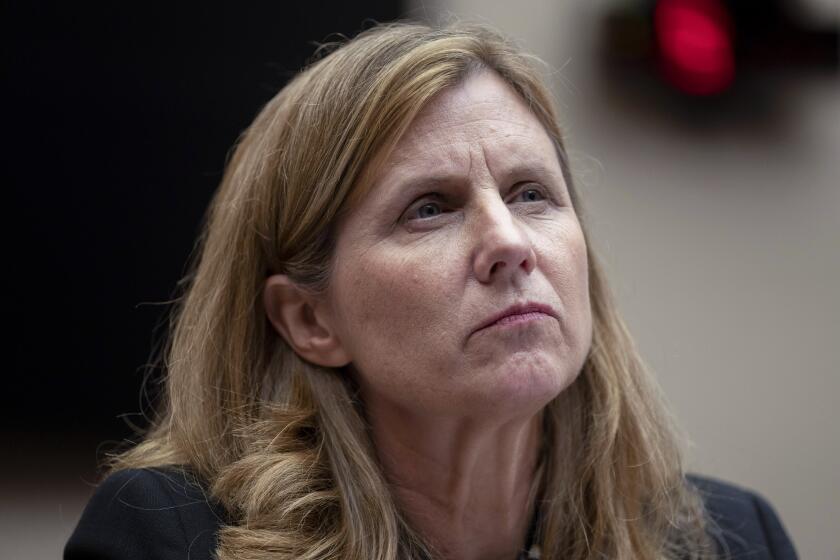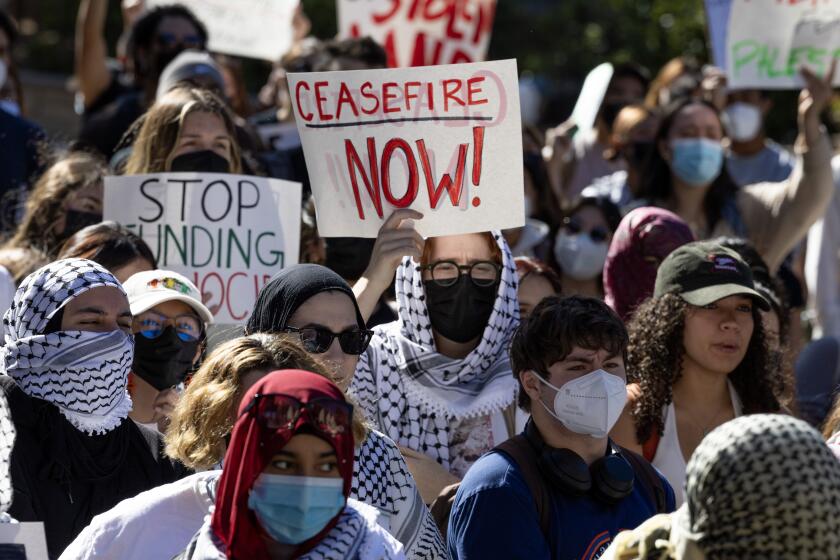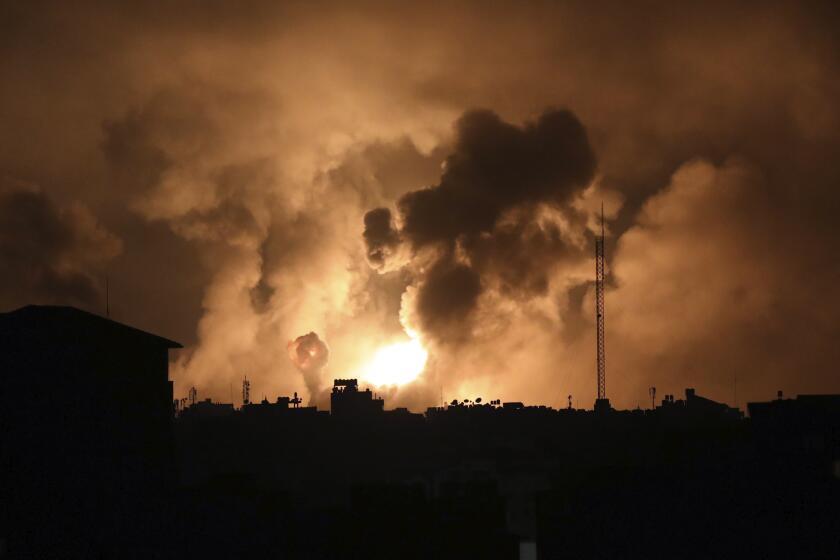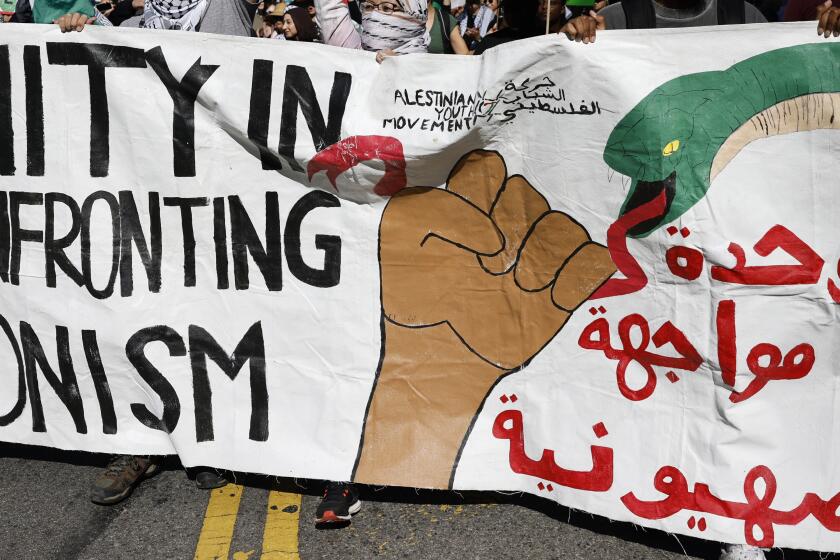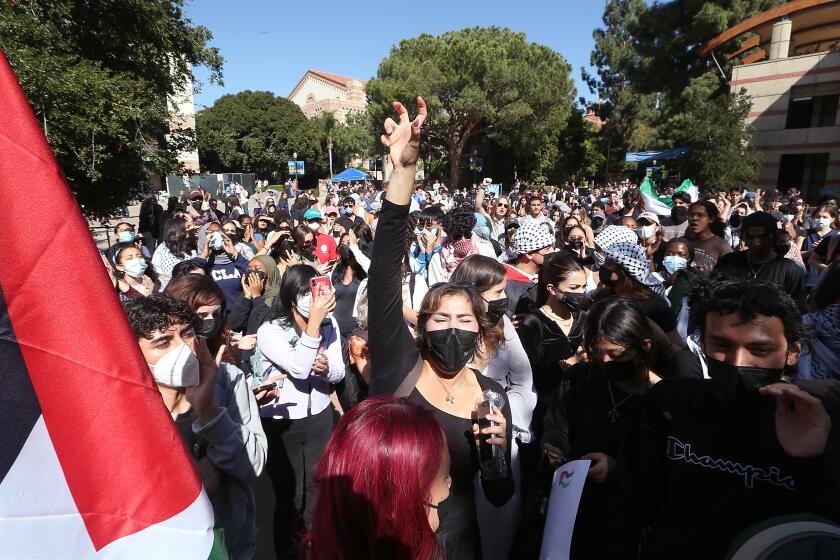Opinion: The trouble with Congress or college presidents policing free speech on campuses
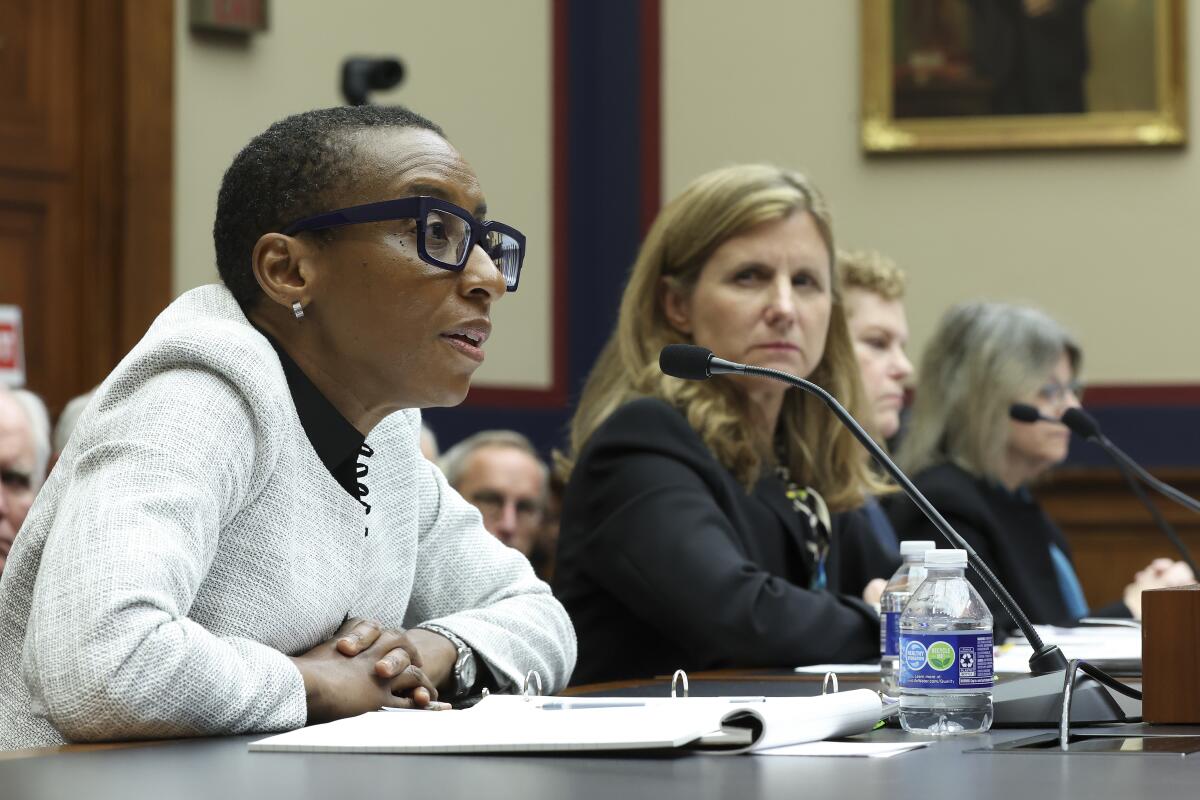
- Share via
On Tuesday, the presidents of Harvard, the University of Pennsylvania and the Massachusetts Institute of Technology testified at a congressional hearing on “Holding Campus Leaders Accountable and Confronting Antisemitism.”
At the hearing, Rep. Elise Stefanik (R-N.Y.) asked University of Pennsylvania President Liz Magill: “Does calling for the genocide of Jews violate Penn’s rules or code of conduct, yes or no?” Stefanik was referring, among other things, to phrases such as “There’s only one solution: Intifada revolution,” which suggest mass violence against Jews in Israel.
Magill’s reply — that the answer was “context-dependent” — has prompted rare bipartisan unity and a chorus of condemnation. Indeed, it led Magill to later backtrack, then to call for reevaluating university policy to restrict more speech, and finally to resign.
University of Pennsylvania president and board chair resign as antisemitism testimony draws backlash
University of Pennsylvania President Liz Magill has resigned amid pressure from donors and criticism over testimony at a congressional hearing.
Antisemitism on campus is a real problem, and in this fraught moment, many Jewish students are understandably scared. But if freedom of expression is to survive on American campuses — and for our nation’s vitality, it must — Magill’s original answer was right. Context does matter.
The categorical exceptions to the 1st Amendment are few, narrow and carefully defined by precedent. And while Penn is a private university not bound by the 1st Amendment, its policies commit the school to 1st Amendment standards.
I can be both broken-hearted over Israelis killed in the Hamas attacks and also grieve Palestinians killed in Israel’s retaliation.
Under the 1st Amendment, speech intended to and likely to cause imminent illegal conduct is unprotected “incitement.” Discriminatory harassment targeting particular students isn’t protected. True threats — serious expressions of an intent to engage in illegal violence against a particular person or group of people — aren’t protected. Promising to “bring an assault rifle to campus and shoot all you pig jews,” as a Cornell student allegedly did in October, is a punishable true threat.
Whether other statements are constitutionally protected does turn on context. For example, calling for “intifada” at a peaceful march is generally protected political expression. Even urging attacks on Israeli civilians, advocating in general terms for violence elsewhere at an unspecified time against a broadly defined target, remains protected speech.
Abcarian: She got fired for condemning Palestinians. He got fired for blaming Israel. Is that right?
Emotions are running so high that people who step into Israel-Gaza controversies — no matter the side they take or how vociferously — are paying a price.
But in a different context, an “intifada” chant might be a true threat — if, for instance, a speaker directed that statement at a specific Israeli American student while moving threateningly toward that student during a protest that has turned violent. And coupled with other targeted, unwelcome conduct, it might be punishable discriminatory harassment.
The 1st Amendment doesn’t have an “advocacy of genocide” exception, nor do the promises of student free speech that many private universities properly make. And for good reason: Students must be free to debate what is proper to do in war, and what wars are just.
Indeed, any new rule prohibiting “advocacy of genocide” could easily be used against pro-Israel speakers. Many argue that Israel is entitled to kill as many Hamas fighters as it can, and if Hamas hides behind civilians, then Israel is entitled to kill the civilians to get to Hamas.
College officials may fear being perceived as taking sides in the Israel-Hamas conflict, but it is wrong to confuse condemning antisemitism with ignoring the plight of the Palestinians.
But others argue the state of Israel was wrongly created on Palestinian land, and that Israeli Jews need to be expelled from it — through mass relocation if possible, or through combat. There are those who take the view that the Hamas attacks were self-defense, and the Israeli retaliation is therefore genocide.
Now, one might think these positions are sharply different morally. But whatever one’s moral views, students should be free to debate the matter by arguing varying positions, even when such calls are deeply offensive to some, many or most. None of us should want campus bureaucrats making inevitably political decisions as to what really constitutes genocide.
No college student should be made to feel unsafe on campus. Most genuinely care about all civilians affected by the terror attack on Israel and the humanitarian crisis in Gaza.
Focusing less on the label “genocide,” other debates on wars that result in mass killing of civilians and whether such outcomes are justified under certain circumstances could run into the same problem. Imagine a student arguing that Israel should respond to an Iranian nuclear attack by dropping a nuclear bomb on Tehran, a city of 12 million, in order to demonstrate that killing Israelis will lead to the killing of Iranians.
Such an argument seeks to justify the killing of countless civilians by relying on a hotly disputed moral claim: that killing may be justified if it deters other killing. But a broad rule against “calling for mass killing” would render this discussion subject to punishment. Indeed, it would mean students could be punished for using the same argument to defend the American bombing of Hiroshima and Nagasaki.
Universities must keep students safe from true threats and punish targeted harassment, violence, vandalism, and other unprotected conduct. But to truly deliver on the promise of higher education, university leaders — and Penn’s next president — must do all of that without abandoning free speech standards.
Eugene Volokh is a professor at UCLA School of Law and a Visiting Fellow at the Hoover Institution, Stanford. Will Creeley is legal director at the Foundation for Individual Rights and Expression.
More to Read
A cure for the common opinion
Get thought-provoking perspectives with our weekly newsletter.
You may occasionally receive promotional content from the Los Angeles Times.
